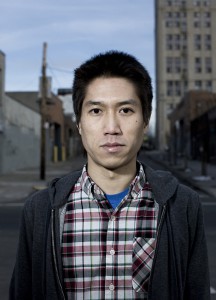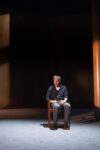 Tao Lin may be the most “controversial” young novelist in America (I’m particularly fond of the noise people who don’t like Lin make when his name or work is brought up usually make, which goes something like “pfthfpth”). One point I forgot to make in our “Book Club” discussion of The Late American Novel: Writers on the Future of Books is that I had hoped Lin would be included and was disappointed that he wasn’t. Yes, he has a schtick, but, between the inverted commas, lies remarkably insightful and “subversive” writing that’s also funny as hell. Lin is, in my opinion, one of the most interesting contemporary writers of any age, sex, or location. As Full Stop‘s resident Tao Lin enthusiast, I feel that it’s my duty to report on an essay the author recently published in the New York Observer.
Tao Lin may be the most “controversial” young novelist in America (I’m particularly fond of the noise people who don’t like Lin make when his name or work is brought up usually make, which goes something like “pfthfpth”). One point I forgot to make in our “Book Club” discussion of The Late American Novel: Writers on the Future of Books is that I had hoped Lin would be included and was disappointed that he wasn’t. Yes, he has a schtick, but, between the inverted commas, lies remarkably insightful and “subversive” writing that’s also funny as hell. Lin is, in my opinion, one of the most interesting contemporary writers of any age, sex, or location. As Full Stop‘s resident Tao Lin enthusiast, I feel that it’s my duty to report on an essay the author recently published in the New York Observer.
That essay, “Does the Novel Have a Future? The Answer is in this Essay!” is a gem, a piece as provocative and moving as any of the essays in The Late American Novel. Lin begins by summarizing a number of essays written about the future of the novel since his birth in 1984 — including works by Gore Vidal, Mary Robison, John Barth, Jonathan Franzen, and Zadie Smith. Lin then summarizes his summaries:
A summary of the above:
XX: Group A is bad.
Group A: [no response]
Group B: [inquisitive thoughts about itself]
YY: Group B is bad.
Group A: It’s O.K. to like different kinds of writing.
Group B: It’s O.K. to like different kinds of writing.
ZZ: Group B is “disingenuous.”
Group B: [no response]
YY: I feel like YZ himself wouldn’t read his last three novels.
ZZ: If YY doesn’t enjoy YZ, that doesn’t mean other people can’t.
ZX: YY and YZ are behaving like opposing gangs because there isn’t enough literary criticism happening.
ZY: Our culture is currently bad because one kind of writing—C, “lyrical realism”—is dominating.
Group C: [no response]
Those “complaining,” or “on the attack,” seem to operate with an amount of generalization and judgment and omission that their targets feel reluctant or unwilling to engage with directly (and that every participant, I feel, would likely want to avoid in their fiction), resulting in a comically uneven, at times suddenly directionless, almost zanily halfhearted narrative.
Interestingly, and touchingly, to me, Group A and Group B—despite being very different, most would agree, I think, in terms of their fiction—consistently expressed support and appreciation for each other.
The conclusion of Lin’s essay is both deeply moving and something that should be read by all of Lin’s haters, as it counters two of the biggest criticisms I’ve heard about Lin’s work: that he writes like some sort of autistic computer and that his work is nothing but self-important gimmickry. Here’s the very end:
I currently feel most interested in reading/writing novels that aren’t improvements on or innovations of other novels. I want to view each potential novel as already definitively and unavoidably unique, improvable only in comparison to itself and then only from its creator’s singular perspective. I want to learn about another human’s unique experience from reports they’ve made themselves while excitedly aware that they alone, regardless of what others are thinking or doing, have access to what they’re reporting upon. I do, sometimes—rarely, I think—want to know, “What do you think other people are going to be thinking about in 20 years?” or “How do you feel humankind, generally, is going to feel like in 50 or 100 years?” But mostly I want to know, “What are you thinking about?” and “How do you feel?”
Yes.
This post may contain affiliate links.








